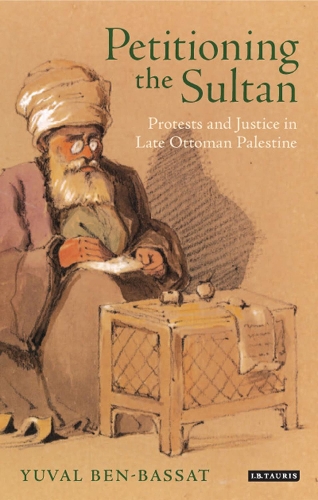
Petitioning the Sultan: Protests and Justice in Late Ottoman Palestine
(Hardback)
Available Formats
Publishing Details
Petitioning the Sultan: Protests and Justice in Late Ottoman Palestine
By (Author) Yuval Ben-Bassat
Bloomsbury Publishing PLC
I.B. Tauris
30th November 2013
United Kingdom
Classifications
Tertiary Education
Non Fiction
Political control and freedoms
956.94034
Physical Properties
Hardback
344
Width 144mm, Height 218mm, Spine 36mm
580g
Description
The practice of petitioning the Ottoman Sultan was a well-known institution which existed in one form or another throughout Ottoman history and enabled Ottoman subjects, far from the capital of Istanbul, to convey their grievances directly to the supreme ruler. Here, Yuval Ben-Bassat examines the petitions, including many previously unpublished ones, sent during the last decades of the Empire to the Ottoman Sultan Abdulhamid II. The petitions enable Ben-Bassat to explore Palestine's history in this formative period from a unique perspective, providing first-hand accounts of the dilemmas, struggles, acts, concerns, schisms and transformations Palestinian society experienced. Petitioning the Sultan will be of great interest to a broad audience of specialists studying the history of the Middle East, the Ottoman Empire, and Palestine's late nineteenth- and early twentieth-century world.
Reviews
'Based on meticulous and path-breaking research in the Ottoman archives, Petitioning the Sultan opens a window onto little-known aspects of the modern history of Palestine. An excellent example of "history from below", this book reveals how a wide range of the population interacted with the central authorities in relation to injustices perpetrated by local officials and the incursions of early Zionists and other foreigners. This is a fascinating and original study that deserves to be widely read.' Rashid Khalidi, Edward Said Professor of Arab Studies Department of History, Columbia University 'Petitioning the Sultan is a fascinating work. It offers readers a unique sense of how a wide range of the population of Ottoman Palestine related to the central authorities, throwing into relief the matters they saw as either of pressing importance or as representing profound injustice, or both. Based on careful research using hitherto little known documents, Ben-Bassat's examination of petitions to the Ottoman central authorities opens a window to the attitudes and defensive strategies of "ordinary Ottoman subjects" when faced with arbitrary actions by local authorities or incursions by foreigners, both early Zionists and others. This is a book that will undoubtedly be of great value both to scholars of Middle Eastern studies and to an interested readership more broadly.' A. Holly Shissler, Associate Professor of Middle Eastern History, Department of Near Eastern Languages and Civilizations, University of Chicago
Author Bio
Yuval Ben-Bassat is Lecturer in the Department of Middle Eastern History, University of Haifa, and holds a PhD in Near Eastern Languages and Cultures from the University of Chicago.
